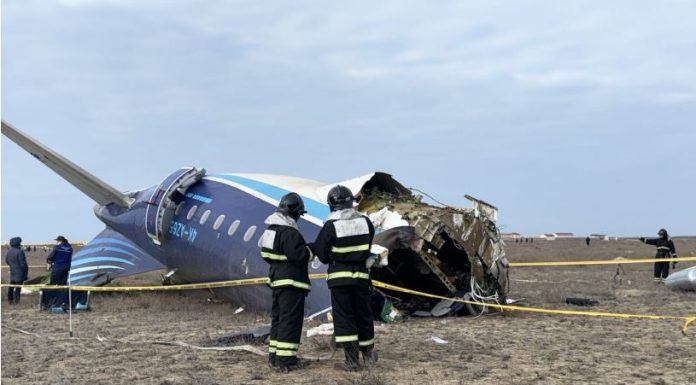BAKU: It increasingly appears that the Azerbaijani jet that crashed in Kazakhstan was shot down by Russian air defenses. Officials and government-connected media news outlets in Azerbaijan are already excoriating Russia for causing the deaths of 38 of the 67 passengers and crew aboard the commercial flight.
The jet took off from Baku on December 25 bound for the North Caucasus city of Grozny, the capital of the Russian region of Chechnya. Initial reports coming out of Russia indicated that a bird strike caused a systems failure aboard the jet, and that fog prevented an attempted landing in Grozny. The pilot subsequently opted to try to make an emergency landing in the Kazakh city of Aktau, across the Caspian Sea. The plane burst into flames during the crash-landing attempt but rescuers managed to save 29 individuals.
On December 27, preliminary results called the bird-strike narrative into question, instead indicating the jet experienced “physical and technical external interference,” the British Broadcasting Corp. reported. Reports circulated that the plane had been subjected to radar jamming. Other reports indicated that the area around Grozny had been the scene of Ukrainian drone attacks at around the same time the Azerbaijani flight was approaching the area. In addition, video images of the crashed jet in Kazakhstan showed the tail section peppered with small punctures, as if it was hit by anti-aircraft flak.
The Reuters news agency reported that survivors reported hearing loud bangs before the jet started flying erratically. Some reported receiving shrapnel-like wounds. Reuters also quoted an Azerbaijani source close to the investigation as saying Baku expected Russia to take responsibility for the tragedy.
Rasim Musabekov, an Azeri MP and member of the parliament’s Foreign Relations Committee, was unequivocal in assigning blame to Russia, the Turan news agency reported.
“The plane was shot down on the territory of Russia, in the sky above Grozny. And it is impossible to deny it,” Turan quoted Musabekov as saying. “Those who committed this should be held criminally liable, it is necessary to pay compensation for the death of people and victims.”
Rashan Nabiyev, Azerbaijan’s minister of transportation, indicated that investigators were now trying to determine what type of anti-aircraft weapon brought the plane down, Azerbaijani media outlets reported.
Government friendly news outlets in Baku were quick to criticize Russia for negligence on multiple levels. “The Russian side should have closed its airspace for civilian aircraft, but this was not done. The reason why a no-fly zone was not declared over Chechnya is a big question,” a commentary published by the Caliber news outlet stated.
The Caliber commentary went on to hint at sinister Russian intentions aimed at covering up the role of Russian air defenses in the crash.
“As is known, the airport in Grozny did not allow the plane to land. In addition, our plane was not allowed to land at the airports of Makhachkala and Mineralnye Vody [nearby Russian cities with suitable airports],” according to Azerbaijani report.
“The disoriented flight crew … was directed to the city of Aktau in Kazakhstan,” the commentary continued. “It can be assumed that this recommendation was given with one goal: to make the plane fall into the Caspian Sea, all witnesses would die and the plane would sink. However, this, let us note, is our assumption.”
Russian authorities have so far refused to assume any blame for the tragedy. Kremlin spokesman Dmitry Peskov has deflected questions about the cause of the crash, warning against a rush to judgment. “It would be wrong to put forward any hypotheses before the investigation’s conclusions, he said on December 26. The following day, Peskov acknowledged seeing Musabekov’s comments, but stated: “I have nothing to add.”
An ancillary factor in the crash is the Azerbaijani government’s own decision to keep its land borders closed. Grozny is within driving distance from Baku, but with the frontier sealed, making the overland journey is not possible. The Azerbaijani national carrier AZAL launched the Baku-Chechnya air route last April in response to growing demand by would-be travelers, many of them potential labor migrants seeking more lucrative employment opportunities in Russia.
On December 27, Azerbaijan’s prolonged its closure of land borders for another three months. Some in Azerbaijan took to social media to criticize the decision. “If land borders were open, perhaps this accident would not have happened. Keeping borders closed without a valid reason both places an additional financial burden on people and restricts their freedom of movement. Opening borders will not only make people’s lives easier but can also help prevent such tragedies,” Vafa Nagi, an Azerbaijani political activist, said.
















